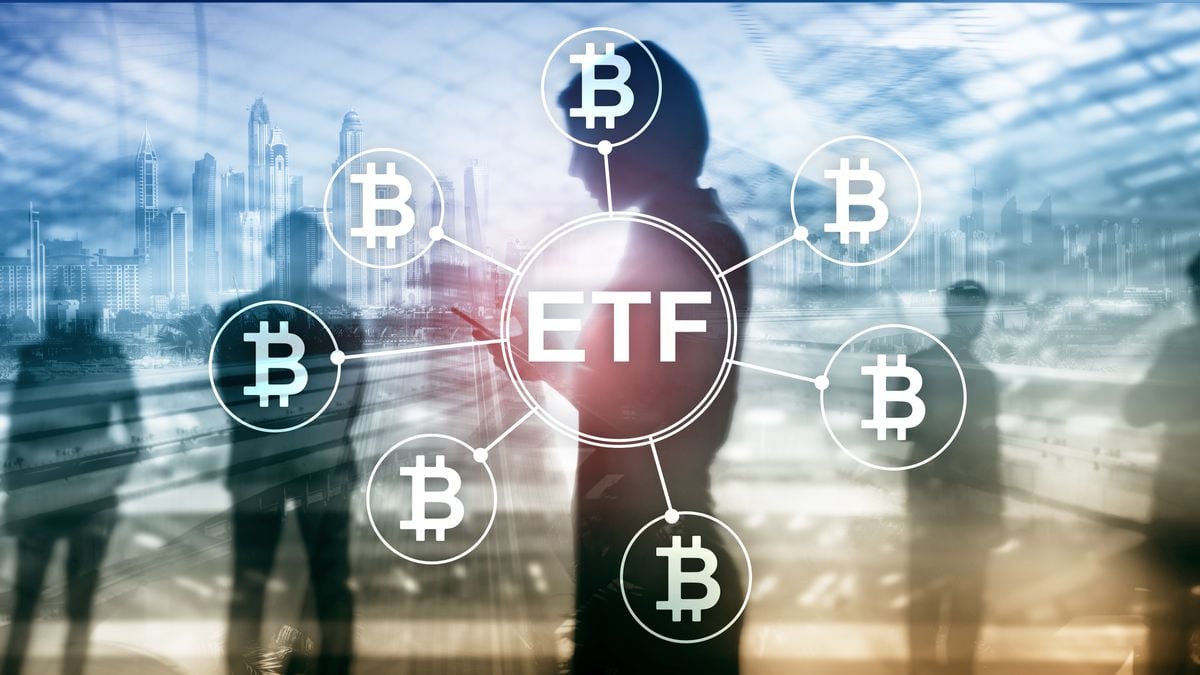An illustration of the cryptocurrencies litecoin, ripple, and ethereum.Jack Taylor / Getty Images
The nightmare started with two simple messages.
"The
community bot,
[computer program that performs automatic tasks], is closed at this time. All accounts are frozen without the possibility of making reinvestments ”, warned one of the texts sent to its users in September of last year by the company Arbistar 2.0., Which emerged in 2019 in Arona, a municipality of 80,000 inhabitants on the island of Tenerife. "In the event that there are clients who file complaints about this fact, we will paralyze their payments until the judicial resolution is determined," also threatened the company, which until then claimed to have created a manna: a bot that operated in the cryptocurrency market and that he managed, by “buying them cheap” and “selling them more expensive,” multiplying at a frantic rate the money of those who invested through him. The formula seemed simple. But, according to the researchers,the pyramid scam was served.
More information
"If I earn 80,000 euros investing it gives me a good car"
The CNMV warns of a historic rebound in financial fraud related to cryptocurrencies
Cryptocurrencies: the money revolution that (for now) is just speculation
A little more than a month after those messages, the CEO of Arbistar was arrested: Santiago Fuentes, a character who had broken into the sector through a YouTube video and an old acquaintance of the police, involved in the pyramid scheme concocted by Germán Cardona, known as the Spanish Madoff, and from which he was acquitted in 2017. Now his case, which has been investigating the courts for months, has advanced a phenomenon that has not been slow to explode: the cryptocurrency boom has given way to the boom of crypto scams. The National Court has already assumed three different investigations (the
Arbistar
,
Algorithms
and
Kuailian cases
), on an alleged total fraud that exceeds 350 million euros and leaves tens of thousands of potential victims.
But, in addition, this same judicial body is currently studying whether to assume a fourth instruction (the
Nimbus case
), for facts whose economic damage has been estimated by the Civil Guard at 112.5 million euros.
Screenshot of the Arbistar 2.0 website.
Although each case has its peculiarities, the judges and agents describe in their first reports the plots of shell companies with offshoots abroad, front men, companies in tax havens, alleged money laundering operations and victims in different countries. All this, varnished with huge advertising campaigns and promises of exorbitant returns, of up to 15% or 25%, that put the savers long teeth. "Each scam has its personal touch," starts the lawyer Carlos Aránguez, who defends groups of affected people, but "also points in common." The lawyer describes the defendants as "professional scammers" with an "enormous capacity for conviction," whose strength "is not new technologies," but marketing. “Arbistar spent about 23 on events, hotels and restaurants.000 euros per month, but less than 2,000 in computer engineering ”, exemplifies this former prosecutor.
To Javier Biosca, the head behind Algorithms and in provisional prison since his arrest in June after a search and arrest warrant was issued
,
they also describe him as a born public relations man. According to the complainants, who put their fraud at more than 250 million euros and 4,000 injured, it reached its alleged victims recommended by clients, friends and family. He moved like a fish in water at parties and meals; he even attended the solicitation of one of his investors. Of course, he left Toledo and moved to the ostentatious Marbella, where money flows in society, according to the lawyer Emilia Zaballos, who also presents herself as president of the Association of People Affected by Investments in Cryptocurrencies: “She organized the 'bitcoin party 'at his Marbella mansion in late summer [2020]. To her he invited his intermediaries and possible people who handle large amounts of money. A party full of glamor that ends up convincing the skeptics ”.
This type of "enlightened", as Zaballos defines them, would not have sprouted without the ideal breeding ground. Luis Garvía, professor and director of the master's degree in Financial Risks at ICADE Business School, explains: “We are experiencing a change of era: we are going from an industrial society to a digital one. And this problem of scams is one more face of that ”, he emphasizes. This analyst describes a traditional financial system that, in the midst of transformation, offers very low returns to savers who are looking for alternatives. And there the cryptocurrency markets appear, and a reinvention of the traditional pyramid scam, concocted by those who attract clients, ensuring that they buy cryptocurrencies with that money and that, thanks to their good work, they generate a huge profit, although what really happens is, as in other similar cases,that only the entry of new investors serves to pay interest to the old ones; something unsustainable.
Judge Joaquín Elías Gadea, instructor of the National Court, includes Kuailian in that group, with a number of affected and damage that is still “not determined”: “Clients, according to the agreed conditions, could get more affiliates for the platform through their account, and they received 10% of the investment of those captured in their first level, 3% of those of the second level, 2% in the third level and so on until a total of 20% invested for each one; which generated an exponential network of massive recruitment [...] The recruitment of new investors would feed the base of the pyramid, allowing the return and payment of benefits to the initial investors, without the operation responding to a real business ”.
Arbistar, Algorithms and Nimbus also fit the pyramid scheme typology.
Regarding the first case, the judge also José Luis Calama says: “What this plot allegedly did was use a part of the money obtained from investors to deliver it to other previous investors in payment of the high agreed interest, which generated great confidence in them that their investment was safe and very profitable, in such a way that they encouraged themselves to invest a greater amount of money in the hope of obtaining an even greater return ”.
Pandemic and savings
The emergence of the coronavirus in 2020 did not help either. Luis Garvía emphasizes that millions of people were locked in their homes, fearful of an uncertain future and glued to the screens of their digital devices. According to data from the INE, the savings rate of Spanish households shot up 14.8% last year. Many thought that that money had to be invested and saw their opportunity in the cryptocurrency market - in addition, with one of them, bitcoin, runaway at that time. Carlos Aránguez emphasizes that idea: “People felt financial anguish and wanted to put the money to work. There were those who reversed the compensation for a job dismissal. He saw disruptive technology and thought higher interest payments were coming back. Besides, you always want to believe that yours is not a scam ”.
But the alerts were there. Since 2018, the National Securities Market Commission (CNMV) and the Bank of Spain have warned on several occasions “about the risks” that cryptocurrencies pose, “in particular” for small investors. In a note from last April, the CNMV went even one step further by targeting the advertising that circulated about these products, specifically directed at retail clients, after detecting how their “intensity” and the media used in these marketing campaigns grew. promotion. And it warned of the possibility that "they did not incorporate objective information."
This same July, the
Official State Gazette
has published the new law against tax fraud that obliges companies and
brokers
(commission
agents
) to “report on balances” and “holders” of the cryptocurrencies that they hold, as well as the “operations ( acquisition, transmission, exchange, transfer, collections and payments) in which they intervene ”. All those who have "virtual currencies abroad" must also declare it to the Treasury.
Is there a need for more regulation? “The legislation is already in place, it must be adapted,” Garvía responds: “But, above all, the investor must be educated. Because there are huge paradoxes. For example, the possibility of access to information today is greater than ever, but the inequality between those who access and those who do not have also skyrocketed ”, he reflects. Professor Garvía also explains how the latter may also want to benefit from this market and, "desperately", put themselves in the hands of scammers and see their money disappear without them being able to do anything.
Santiago Fuentes, to whom the judge attributes an alleged scam that can reach 100 million euros and 32,000 affected, summarized it in one of the videos that he posted on the web: “If one day Arbistar went to hell, you would stay with silly face ”.
He got it right.
What are cryptocurrencies
A cryptocurrency is a digital asset that uses cryptographic encryption to guarantee its ownership and ensure the integrity of transactions, and to control the creation of additional units, that is, to prevent someone from making copies as they would, for example, with a photo .
These coins do not exist in physical form: they are stored in a digital wallet.
In recent months, numerous cryptocurrencies, including Bitcoin and Ether, have experienced high volatility in their prices, which has been accompanied by a significant increase in advertising, sometimes aggressive, to attract investors. There is still no framework in the European Union that regulates crypto assets such as Bitcoin, and that provides guarantees and protection similar to those applicable to financial products. Currently, a Regulation (known as MiCA) is being negotiated at the European level that aims to establish a regulatory framework for the issuance of crypto assets and the service providers on these. As the CNMV and the Bank of Spain recall in a recent statement, cryptocurrencies are not considered a means of payment,they are not backed by a central bank or other public authorities and are not covered by client protection mechanisms such as the Deposit Guarantee Fund or the Investor Guarantee Fund.











